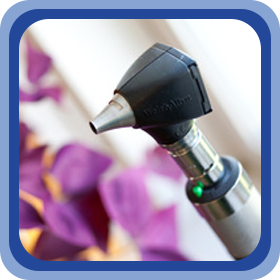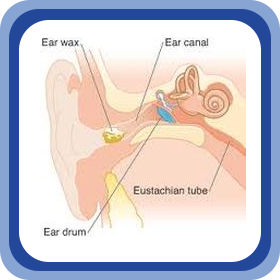
Diagnostic Hearing Evaluations
A comprehensive hearing evaluation is performed by a Doctor of Audiology and will determine if you have a hearing loss. We will clearly explain the degree and type of hearing loss you have. Only then can an appropriate treatment plan be recommended. First the audiologist will examine your ears for possible physical causes such as wax build-up or infection. Then testing is performed in a sound booth for the Audiologist to measure your ability to detect sounds at various frequencies (pitches). Tympanometry is also conducted to evaluate the status of the middle ear.
After carefully assessing the results of your hearing evaluation, Dr Bass will determine whether your condition is in need of medical treatment, which would initiate a medical referral to a physician. Only 10 percent of hearing losses are medically treated. If your hearing loss is not medically treatable, the audiologist will consider other treatment options such as hearing aids to help you hear better.
For more information click here for a WRITTEN HEARING EVALUATION

Earwax (Cerumen) Removal
We use several methods to remove wax. Commonly, a small instrument is used to scoop wax from the ear. In some cases, the ear will be flushed with water. Other times, a more sophisticated method using an ear vacuum will be employed. In extreme cases where the wax has hardened and is difficult to remove comfortably, the patient will be given softening drops to use at home to soften the wax prior to removal.
Once softened, the patient returns for complete wax removal. We understand some patients feel “uneasy” about this procedure, therefore our goal is to make wax removal as painless as possible.

Hearing Instrument Consultation
The audiologist will provide various solutions and recommendations well matched to your individual needs. When you choose hearing aids, you will need to make two choices: 1) The physical size of the hearing aid and 2) The level of digital technology (basic, mid-level, advanced) you will have inside. Specifically, the physical size (or style) of the hearing aid needed is dictated by the amount of hearing loss you have and the physical size of your ear. The level of digital technology needed is based on how active you are and what listening environments you typically encounter. (How often are you in the presence of background noise or in groups of people?) The more active you are, the higher the level of technology you will need for the best correction.
If custom hearing devices are chosen, your audiologist will take an ear impression of your ear, which is a duplicate of the contours of the ear. You will be given a written quote of which hearing aids you chose and the total costs involved.
Hearing Instrument Fitting
After you and the audiologist have selected a solution, your hearing aids will be fit utilizing a computer. There are hundreds to thousands of adjustments possible with today’s hearing aids. With that much flexibility, it takes time to adjust each parameter as needed. This is one of the reasons you will have at least a 30-day trial period with the hearing aids. The audiologist will instruct you on the care and maintenance of the instruments as well as practice insertion/extraction and battery changing. Regular follow-up appointments are vital for optimal hearing over time.
Click on the link below titled What Everyone Should Know About Getting Hearing Aids to more fully understand the process of correcting a hearing loss. During your rehabilitation with hearing aids, the audiologist will perform REAL EAR MEASUREMENT testing to verify that the settings are ideal for your specific hearing loss.
What everyone should know about getting hearing aids
Re-Programming Hearing Instruments: We will gladly “adopt” patients who have purchased hearing aids from out of the area and are in need of “fine tuning”. We understand that a patient’s programming needs do change over time. We are able to make adjustments to hearing aids from most leading manufacturers. We are here to help!
Hearing Aid Repairs & Maintenance: Most hearing devices, whether purchased from Bass Audiology or not, can be repaired in the office or be sent to a manufacturer for repair. We use a special vacuum to remove debris from the ports and ear molds. We also change wax filters, slim tubing and ear mold tubing.
Custom Hearing Protection/Swim Molds: Custom ear molds can be made to protect your ears from excessive noise or water. Noise protectors protect your hearing from damaging noise levels found with activities such as hunting, car races, and using industrial equipment. Even a standard lawn mower can cause damage to the ear. Custom swim plugs can be made for swimming & bathing.
Custom Music Pieces: Earpieces can be made for cell phones and iPod/MP3 players. We can also help you get custom ear monitors for worship teams and musical groups.
OTC Hearing Aids
OTC (Over-the-Counter) Hearing Aids have the potential for great success or great disappointment. Below is our step-by-step recommendations for a pathway to success with OTC Hearing Aids.
Step 1 Hearing Exam
If you do nothing else go to an audiologist for an audiogram. This will confirm if you are a candidate for OTC hearing aids. These devices have strict guidelines that only apply to those with mild-moderate sensorineural hearing losses. If you have a more complex hearing loss or simply a wax build-up, you may be wasting your time and money on OTC hearing aids.
Other Benefits of this exam:
- Some OTC hearing aid’s will be programmed with your audiogram results.
- You will have an established Doctor of Audiology for when you need further healthcare.
- We can confirm if you have an insurance benefit that is more cost effective to use vs. purchasing OTC hearing aids.
Step 2 Considerations Before Buying
You completed your exam and you qualify for OTCs….what’s next?
- Do you want your OTC to run on battery or be rechargeable?
- Do you want Bluetooth capabilities?
- How do you adjust your device? Do you need a smart phone?
- Does the device look comfortable? Will it fit in your ears?
- Is there a warranty or trial period?
- Where do you go for help when it malfunctions?
Step 3 My OTC is Not Working
Do not fear. As your hearing healthcare experts we are here to help!
Call or email our office to schedule an initial consultation. Together we will review your current devices and devise a plan to lead you to success. Below are just some of the ways we can help:
- Evaluate fit and function.
- Remove ear wax.
- Teach you appropriate instrument cleaning and maintenance.
- Verify the benefit you are getting with Real Ear Measurements.
(574) 457-5050 / office@basshearing.com
